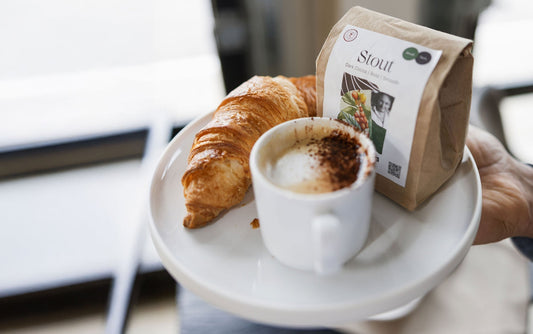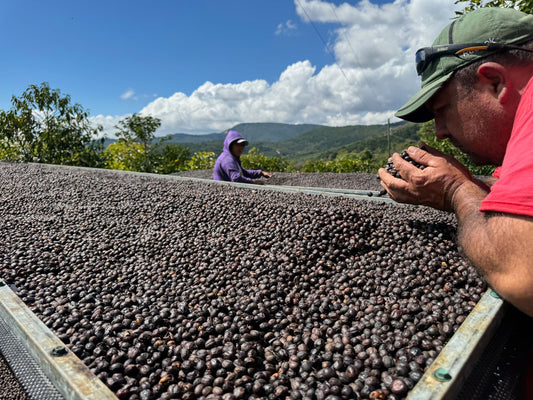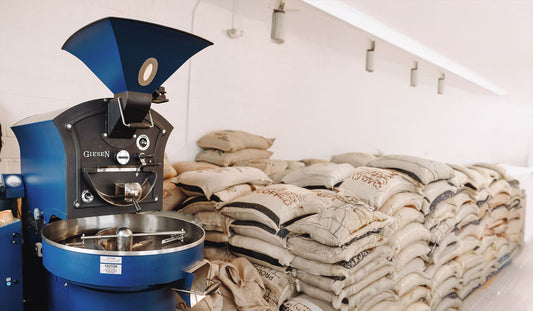Did you know Brazil produces nearly one-third of the world’s coffee, more than any other country? With such a dominating presence in the industry, coffee cultivation in Brazil naturally varies from farm to farm, but the vast majority (roughly 70%) of Brazilian coffee beans are the Arabica variety.
Brazil’s tropical climate and low-altitude terroirs often produce robust, full-bodied coffees that are significantly less acidic than coffees from other coffee-growing regions. Brazilian coffees typically have notes of chocolate, caramel, and nuts. With a deep, dark flavor profile and rich mouthfeel, Brazilian coffees are often used in espresso blends.
Brazil’s coffee production ranges from tiny, family-run farms to vast estates that produce more coffee independently than some small countries. While it’s impossible to fully explain the countless farming, harvesting, and processing traditions, rituals, and techniques in Brazil, we hope to shed some light on the country’s coffee heritage, as well as its current culture.
Now that you have a fundamental understanding of Brazil’s role in the coffee industry, let’s explore further.
The Genesis of Brazilian Coffee
It’s believed that the first coffee plant was planted in Pará in 1727. The Coffea plant species wasn’t native to the Americas, but the Portuguese settlers were interested in establishing Brazil’s coffee production presence in order to join the rising market.
The governor of neighboring French Guiana refused to import coffee plant seeds to Brazil, forcing them to seek out an alternative way to obtain them.
According to legend, a Brazilian diplomat named Francisco de Melo Palheta traveled to French Guiana to settle a border dispute. Before returning home, he (allegedly) found favor with the governor’s wife, who gave him a secret gift of a flower bouquet with hidden Coffea seeds.
The Rise of the Brazilian Coffee Empire

In the following decades, coffee cultivation in Brazil took off rapidly. The country’s southern and northern regions became home to vast plantations. Between 1800 and 1820, annual Brazilian coffee production skyrocketed from less than one tonne (metric ton) to more than 5,500 metric tonnes.
Throughout the 19th century, Asia’s coffee-growing regions were decimated by disease. Many farmers immigrated to Brazil to pursue their coffee endeavors, eventually leading to the industrialization of Brazil’s agricultural sector. Brazil’s coffee output continued rising, and by the 1830s, the country had become the world’s largest producer.
20th Century Technological Advancements
As Brazil’s agricultural sector became increasingly industrialized in the early 20th century, emerging technologies became more accessible and present. Farmers adopted new ways of harvesting and processing coffee cherries, exponentially increasing the size and yield of the crops and further solidifying the country as a peerless industry vanguard.
Today, many of those early Brazilian coffee production technologies are still used, such as mechanical harvesting—using machinery to shake the cherries off of the branches. However, many farmers have chosen to employ traditional techniques of the past, such as selective hand-picking and drying the cherries in the sun.
Brazil’s Focus on Sustainability

Although coffee cultivation in Brazil is steeped in tradition, many producers do implement state-of-the-art technologies such as soil monitoring systems and controlled irrigation systems. These modern-day systems are in place not only to increase output and quality, but to ensure that their crops are sustainable and environmentally friendly, especially as climate change presents new challenges.
Over the years, the Brazilian government has implemented strict laws, comprehensive certification programs, and resource conservation initiatives to push for sustainability and traceability in Brazil’s coffee production. Today, approximately 28% of the certified sustainable coffee originates from Brazil.
Furthermore, many farmers collaborate with local communities to safeguard the biodiversity of the coffee growing regions, including adopting agroforestry practices such as intercropping with native species to balance the microclimates of the terroirs.
Discover Specialty Coffees From Around the World
We hope this information helps you to fully appreciate the storied history behind every cup of Brazilian coffee. While Brazil is the top coffee producer, it’s worth noting that every coffee-growing region has its own heritage, culture, and community. One could spend a lifetime learning about and celebrating them!
Brazil’s coffee production is a fascinating topic to research, but the best way to immerse yourself in its history and culture is to simply try Brazilian coffee. Here at Ebru Coffee, we offer sustainable, single-origin coffees ethically sourced from premier coffee-growing regions all around the globe, including Brazil.
Support coffee cultivation in Brazil and beyond. You may discover your new favorite coffee bean variety, and at the very least, you’ll expand your horizons. Experience the farm-to-cup difference with our specialty coffee beans.





